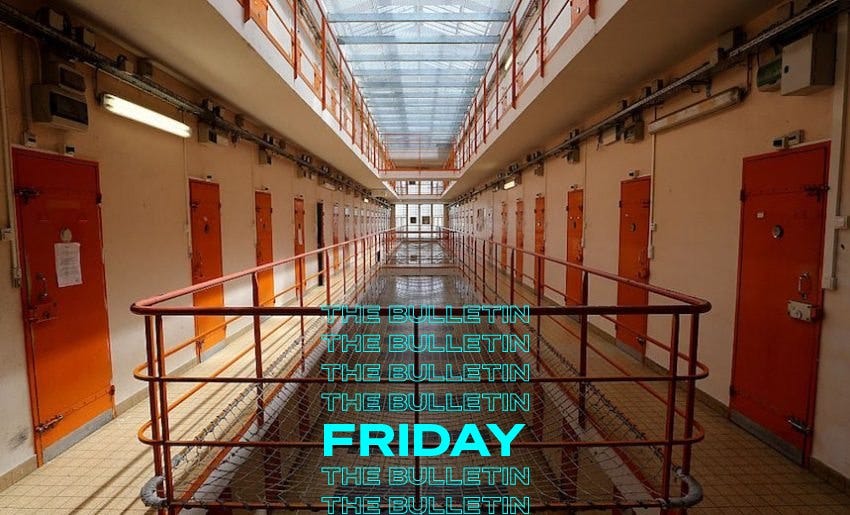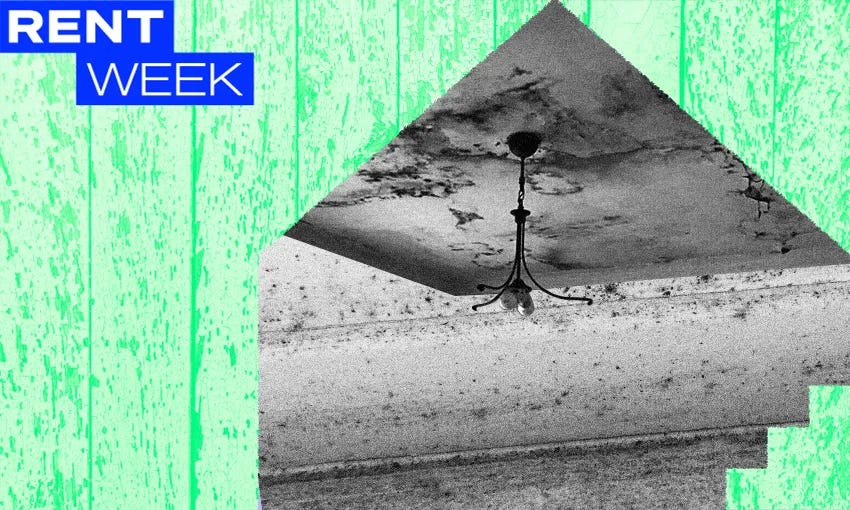Youth justice facilities an incubator for more offending
Youth justice facilities are full and are providing a place to plan for offending on “the outside”. It echoes what we know about prisons.
Mōrena and welcome to The Bulletin for Friday, September 30, by Anna Rawhiti-Connell. Presented in partnership with Z Energy.
In today’s edition: Act MP Karen Chhour accepts apology from Kelvin Davis; the build-to-rent solution; the 16,500 journey to deliver a whistle; but first, what is the purpose of prisons?
We spend $1.3b a year on prisons despite a mountain of evidence that says they don’t prevent crime (Image: Getty)
“Organising to commit crimes on the outside”
I have heard people who work in the criminal justice system refer to prison as “crime university”. It’s a crude phrase, probably born of years at the coalface, but it’s hard to read a report from Stuff’s Glenn McConnell about youth justice facilities being at capacity and not have it top of mind. Oranga Tamariki’s Shaun Brown said some offending was now the direct result of children connecting with each other at Oranga Tamariki facilities and organising to commit crimes on the outside. Brown is urging MPs not to impose more punitive sentences on youth offenders, saying it would have no deterrent and would likely harden them.
70% reconviction rate within two years of being released from prison
While these facilities aren’t prisons, Brown’s comments track with new analysis from sociologist Jarrod Gilbert on The Spinoff about the role of prison and its complete failure to deter offending based on reoffending rates. Around 70% of people with previous convictions are reconvicted within two years following release from prison. Gilbert cites former prime minister Bill English, who in 2011 said that prisons are a moral and fiscal failure. The annual cost of the country's prisons was pegged at $1.3b in March this year. Writing for Stuff about his experience in prison, Tommy Doran says the traits he required to recover from drug and alcohol addiction and quit a life of crime are the same traits that are rejected within our current prison system.
Imprisonment is “an utterly ineffectual tool for reducing crime rates”
It does sometimes feel as if we have two alternate realities operating on the role of punitive sentencing. On one-hand there is the tough on crime rhetoric and on the other, a mountain of evidence and “almost universal agreement by those working in the sector that imprisonment is an utterly ineffectual tool for reducing crime rates”. That’s a line from Newsroom’s Jono Milne in an excellent piece on last week’s crime statistics and the ongoing overrepresentation of Māori within our prison system. Corrections minister Kelvin Davis campaigned on reducing the prison population with a specific focus on reducing the number of Māori in prison. It’s been three years since Hōkai Rangi, Corrections’ flagship strategy aimed at doing that, was launched. Stuff’s Laura Walters has accessed its successes and failures.
Head of corrections believes we can have safe society without prisons
The problem with crime, as Alice Snedden notes in the latest episode of Bad News, is that it’s emotive. People experience it and fear it. It’s why, as Claire Robinson notes in her book on political campaigning, “tough on crime” gets trotted out during election campaigns. Emotion, however, isn’t empirical. Head of corrections Jeremy Lightfoot told Snedden that he believes we can have a safe society without prisons. He also noted that we’re a long way off that. You do wonder what the road to that “long way off” looks like when evidence keeps on proving to be less sticky than emotion.
Get a deal on your home EV charger with Electric Kiwi
New Zealand based company Evnex offers quick and affordable home EV charging. Pair their tech with Electric Kiwi’s MoveMaster plan, allowing you to charge your EV overnight with half price power (11pm - 7am), and you’ve got a sweet combo. As a MoveMaster customer you’ll receive $150 off Evnex’s standard price for an installed Smart EV Charger and have the option to pay off the rest on an interest free payment plan that can be added to your Electric Kiwi bill. If you own an electric vehicle - or are considering buying one - check out the full details here. (Sponsored)
T&Cs apply.
Act MP Karen Chhour accepts apology from Kelvin Davis on “vanilla lens” comment
The minister for children made the comments in the House on Wednesday. Chhour has accepted Davis’s apology saying she thinks it's genuine but said she felt hurt and that her mana had been diminished. "Growing up I always felt lacking in my identity and I finally found that confidence to stand as a proud Māori woman and it was taken away from me yesterday,” said Chhour. For me, it brought to mind this from Nadine Anne Hura on legitimacy, belonging and identity. Hura writes “The truth is, there is no single legitimate way to be Māori. Or perhaps more accurately, there are many ways to be Māori — just as there are many ways to be Pākehā.”
The build to rent solution
Private rentals owned by ‘Mum and Dad’ landlords are expensive and unstable, making it difficult for tenants and their tamariki to settle into their communities and schools. As renting becomes a long-term reality for more and more of us, is there a better way? In this episode, Bernard is joined by Helen O’Sullivan, CEO of Crockers Property Group, to talk about one possible solution, and what policy tweaks the government needs to make to help it grow.
Rec Room is heading back to your inboxes from Monday. Produced in partnership with Panasonic, sign up to Rec Room today and be in to win one of five Technics True Wireless Earbuds.
Click and collect
Just to prove I will not die on the postal voting hill, Auckland mayoral candidates call for an end to postal voting.
Wellintonians, after six years your water is now being fluoridated at the right level.
John Palino’s name is on the ballot for the Auckland mayoralty but where in the world is he?
Explainer on what the UK’s current economic turmoil means for us.
Honey bucks the food shortage trend and that’s a problem for beekeepers.
I forgot to include the results of the poll on phasing out alcohol advertising and sponsorship in sport. As I often get correspondence from rigorously-minded readers about how we report on any polling, I would like to reiterate that it was an internet poll of no proper statistical standing. Onwards. 2,020 Bulletin readers responded: 89% said yes, it was time to phase out alcohol advertising and sponsorship in sport, while 11% said no.
Got some feedback about The Bulletin, or anything in the news? Get in touch with me at thebulletin@thespinoff.co.nz.
If you liked what you read today, share The Bulletin with friends, family and colleagues.
Mould? We'll show you mould. Alex Casey ranks and reviews the mouldiest rental properties in Aotearoa. Toby Manhire painstakingly counts the number of times certain words are used in Policy.nz candidate blurbs in an attempt to better understand what everybody's banging on about. Stewart Sowman-Lund presents a refresher of renting rights, rules and regulations. Shanti Mathias looks at how digital science projects are using the internet to help people access and understand the natural world. Tze Ming Mok writes a poem for NZ Chinese Language Week 2022 and Chris Tse.
The 16,500km journey to deliver a whistle
The Rugby World Cup kicks off in just over a week and three men are cycling the length of New Zealand to deliver the whistle that will be used to start the first game on October 8. Their journey actually started in Japan and by the time they get to Eden Park, they will have cycled 16,500 kilometres. “We’re both rugby fans and we knew neither one of us were ever going to play for the Springboks,” said one of the cyclists. So they’re doing this instead for the women’s game and raising money for charity. Love it.
It’s Friday so…
This is a slight break from the usual Friday tradition, especially if you’re an Alan Rickman fan, as you might find yourself feeling a bit sad. Rickman died in 2016 and kept diaries. They will be published in full soon but the Guardian has published excerpts. The first details his time on set during the Harry Potter films, while the second spans 1994 to the day he learned he had pancreatic cancer. Funny, sharp and then very poignant. I loved reading them and wanted to share.











